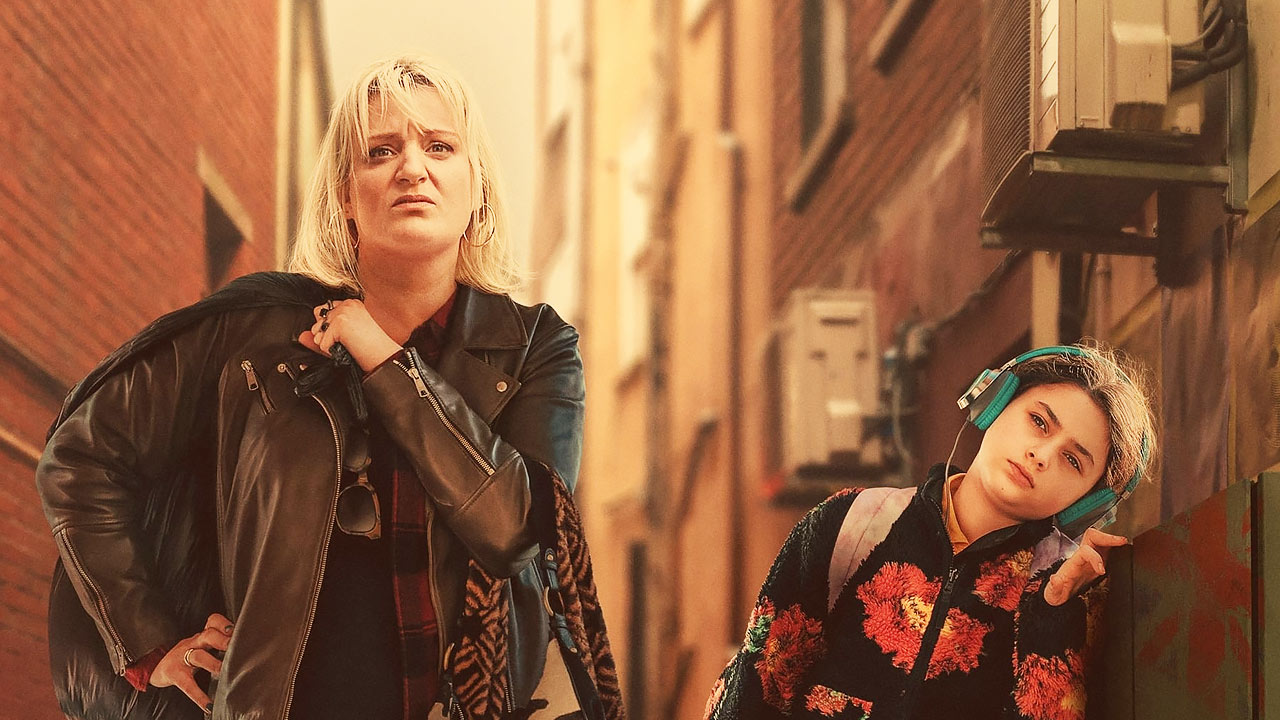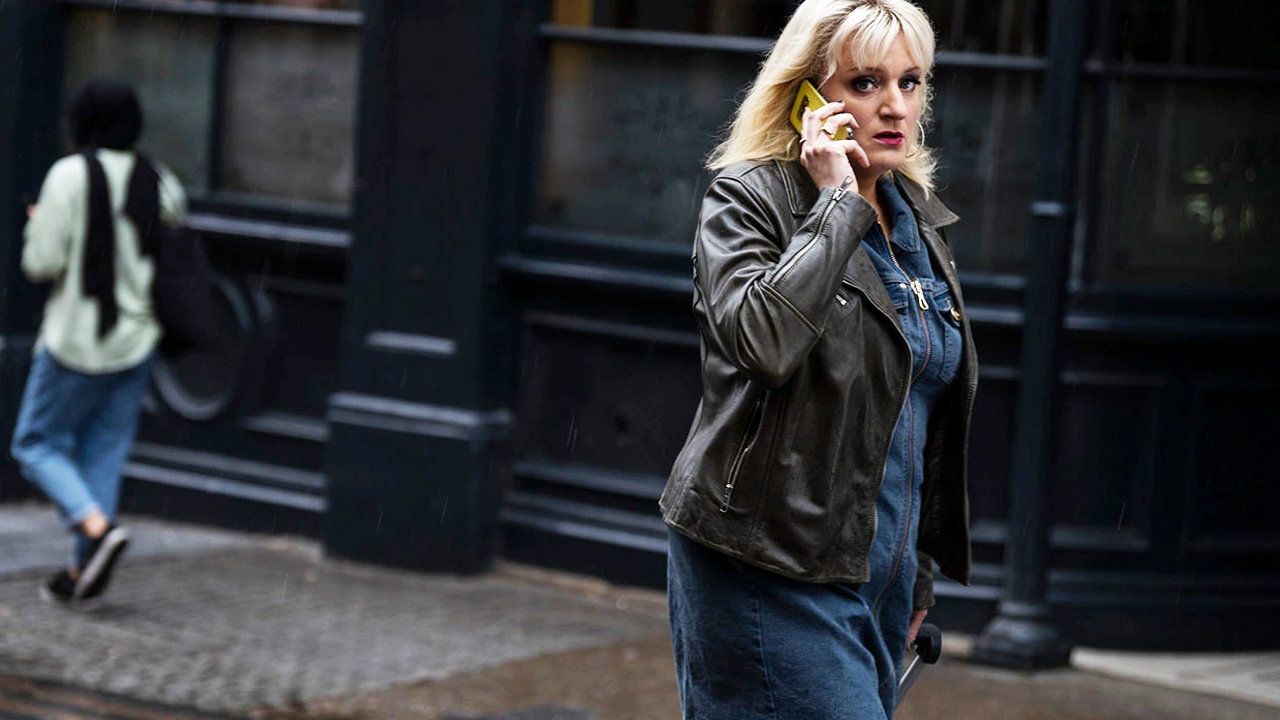The savage, sozzled beauty of Rain Dogs – Britain’s new must-see dramedy
A lively, rough-as-guts Skid Row story that genuinely feels like a product of the streets.

Don’t call it “poverty porn”! Creator Cash Carraway’s new series Rain Dogs flips the bird at stuffy social realist storytelling, with, writes Luke Buckmaster, a dangerously great performance from Daisy May Cooper.
I asked myself, while watching Rain Dogs, whether I’d like to hang out with the show’s characters in real-life or whether it’d be wiser to run for the hills. If one were to trace the cultural roots of creator/writer Cash Carraway’s London-set dramedy, in terms of the kinds of people it depicts and the sorts of stories they tell, one might arrive at the term “kitchen sink realism”—typically used to describe hard luck narratives about the poor and woebegone. I use the “r” word cautiously, understanding that “realism” is a word that can turn people off, potentially making things sound heavy and dyspeptic.
But that would be to seriously misjudge this show: a bold, imprudent, very frisky and funny walk on the wild side, capturing in scuffed-up, skid-marked detail the lives of struggling people who are both products of broken systems as well as their own worst enemies. Scrambling to stay afloat in a world where the odds are stacked against them, while also making precisely the wrong decisions, shaking their fists as they slip and slide through the muck of their lives, it is indeed a very realistic show.
But the sheer oomph and energy of Rain Dogs is what hits you first—before the performances take hold and Carraway’s vinegary comedy works its soured charm.
The first episode begins in media res, at a low-rent apartment building where the protagonist, Costello (Daisy May Cooper), and her young daughter Iris (Fleur Tashjian) are given marching orders by men yelling about them being thousands of dollars behind in rent. Costello responds calmly, sensibly and sedately, peeping through the letterbox and shrieking: “fuckin early, aren’t we?” When the pair storm outside, past the bailiffs, she exclaims “poverty porn at its finest!”—a description presumably intended for people inside the narrative world, watching the brouhaha, rather than a meta description of the series itself.
“Poverty porn” is another one of those baggage-laden terms, conjuring images of bad things happening to hardscrabble people. Which is part of this show, but Carraway gets to have her cake and eat it too—telling a lively Skid Row story that genuinely feels like a product of the streets, while avoiding many pitfalls in portrayals of the pinched and impecunious. Imbuing her characters with wit, intelligence and ambition, she rejects the ubiquitous falsity that poor people can’t be smart and savvy.

Costello is rough as guts, complaining in the second episode about a “gushing case of the thrush” before arriving for work at a peepshow, where her boss announces his daily “pussy check” (at another point, this same silver-tongued man mutilates the Judge Judy-approved expression “don’t pee on my leg and tell me it’s raining,” by changing it to “don’t shit in my mouth and tell me it’s a Big Mac”). The protagonist is also an aspiring author, hoping to turn her memoir into a Dickensian success—“like Oliver Twist, with big tits.”
She’s very far from a pushover, but also vulnerable in her toxically close relationship with her best-friend Selby (Jack Farthing), who’s from a wealthy background but has comprehensively screwed up his life. We meet him as he’s coming out of prison, soon to perform fellatio (off-screen) to an elderly man in a toilet cubicle. There’s also Gloria (Ronkẹ Adékoluẹjo), who works for her father’s funeral parlour and is not averse to having sex in front of a corpse–filled coffin.
Daisy May Cooper delivers a dangerously great performance in the lead role—the entire show is magnetised around her wild, wall-rattling energy. The actor makes Costello feel like a totally original character, with spectacular paradoxes: cultivated but kind of barbarian, shrewd but shortsighted. Rather than chronicling one prolonged, linear period of her life, the series jumps about, messing up the timeline. The various episodes are too closely connected to feel like snapshots or vignettes, and too disparate to maintain momentum, making things feel structurally scrambled but not in a highly creative way.
Other than a slightly bland visual palette, that’s my only gripe. The plus side about the slippery structure is the drama can unexpectedly relocate the characters into different sections of society—from Costello and Iris seeking shelter in a women’s refuge to a brief foray into middle-class, countryside existence. Even in its less eventful episodes the series feels fiendishly fresh. I felt bad, realising that more tragedy for them equals extra entertainment for us.
Do I want to meet these people? Nah. Nor do I want to watch any interviews with Daisy May Cooper: she is Costello, as far as I’m concerned, and I’d prefer not to have that bubble pricked.























